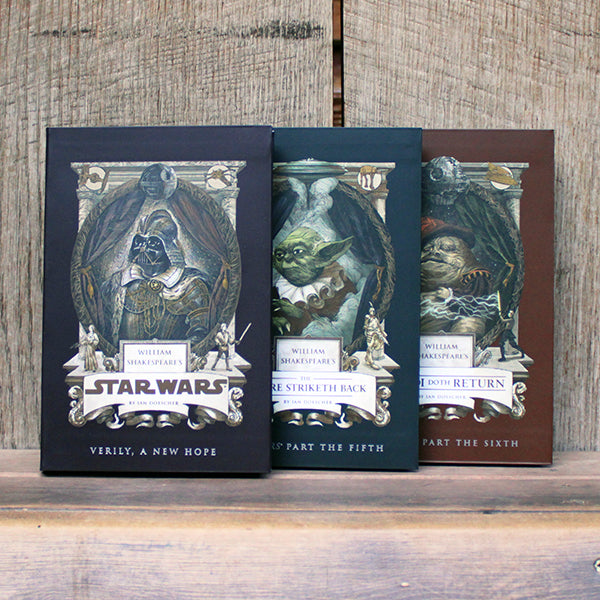
Since they were performed on the original Globe stage, Shakespeare's plays have held a powerful grip on our collective imagination. Let's be honest, though, for many, the thees and thous, and the complexities of Iambic pentameter can feel like a barrier.
Enter the modern adaptation! A fantastic and often surprising way to bridge the gap between the Great Bard and contemporary culture. These books don't just put new clothes on old stories; they re-examine timeless themes for a new generation.
The Bard's Newest Tragedian: Deadpool
When you think of a character who could embody the raw, chaotic energy of a Shakespearean tragicomedy, Deadpool probably isn't the first name that comes to mind. But Deadpool Does Shakespeare challenges that notion in the most hilarious way possible. This graphic novel doesn't just make jokes about the Bard's language; it traps the "Merc with a Mouth" in the very works of Shakespeare. He's no longer just a character; he's a player on a new kind of stage, spouting lines in perfect iambic pentameter and using a crossbow instead of his signature pistols.



The genius of this book is how it uses Deadpool's unique, meta-textual nature to deconstruct the very idea of a classic play. As a character famous for breaking the fourth wall, he's the perfect guide to a theatrical world filled with soliloquies and asides. This is a "comedy of errors," a "midsummer night's dream," and "much ado about nothing" all at once, using the familiar settings and conventions of Shakespeare's stage to highlight the absurdity and pathos of a character who is, in his own way, a modern tragic hero. Deadpool's twisted sense of humour and regenerative abilities allow the comic to explore violence in a way that feels both true to the character and, surprisingly, to the dramatic excesses often found in Shakespeare's plays. It's an insightful, funny, and beautifully chaotic blend of high culture and toilet humour, proving that an adaptation can not only entertain but also offer a fresh, insightful critique of its source material.
The Teen Movie Renaissance: From Padua to Beverly Hills
The influence of Shakespeare in film is undeniable. While the 1995 film Clueless is a brilliant adaptation of Jane Austen's Emma, its clever modernisation of a classic story makes it a perfect entry point for exploring the broader world of Shakespearean adaptations. It's a reminder that the universal struggles of love, identity, and social standing found in Shakespeare's plays are as relevant in a high school cafeteria as they were on an Elizabethan stage.
Consider some of the most beloved cult classics of the last few decades. The quintessential 90s rom-com, 10 Things I Hate About You, is a direct and brilliant retelling of The Taming of the Shrew. It perfectly captures the spirit of the original—a stubborn and unconventional sister who must be "tamed" so her younger sibling can date—and transplants it to a modern American high school. Or what about the 2006 gem She's the Man, which casts Amanda Bynes as a girl who disguises herself as her twin brother to play soccer? This is a vibrant, chaotic, and hilarious take on Twelfth Night, a play famous for its gender-bending disguises and mistaken identities.
The tradition continues to this day. The recent box office hit, "Anyone But You," starring Glen Powell and Sydney Sweeney, is a modern adaptation of Shakespeare's witty and biting comedy, "Much Ado About Nothing." It takes the "enemies-to-lovers" dynamic of Beatrice and Benedick, two sharp-tongued characters who despise each other but eventually recognise their secret love for each other. It sets it against the backdrop of a destination wedding. The film adapts Shakespeare's themes and dialogue for a new audience, proving that the Bard's work is not only timeless but also a rich source for contemporary pop culture.

The Taming of the Clueless takes this a step further, reimagining the iconic Clueless script itself in authentic Shakespearean verse. It's a delightful blend of two cultural touchstones, a true celebration of how a great story, whether from the 16th century or the 20th, can be endlessly reinterpreted and still feel fresh and exciting.
Star Wars: A New Kind of Epic
Author of William Shakespeare's Star Wars Series, Ian Doescher doesn't just drop familiar dialogue into iambic pentameter; he fully commits to the conceit, presenting the films as authentic plays with stage directions, asides, and soliloquies.

Verily, A New Hope reimagines the epic tale of Luke Skywalker, a wise Jedi knight, and an evil Sith lord. By framing the story in the style of a heroic tragedy, Doescher elevates the characters' struggles and gives us a deeper insight into their motivations.


The Empire Striketh Back and The Jedi Doth Return continue this theatrical journey. The Empire Striketh Back draws inspiration from plays like Hamlet and Macbeth, exploring Luke's inner conflict and temptation by the dark side of the Force. The Jedi Doth Return is a culmination of these themes, bringing the saga to a dramatic and character-driven close, much like a classic Shakespearean finale.
The beauty of these books lies in how they use Shakespearean conventions to enrich the original story. Characters deliver soliloquies that reveal their inner turmoil, and the chorus provides poetic descriptions of the space battles. It's a testament to the power of both George Lucas's storytelling and Shakespeare's dramatic structure.
I'm looking forward to getting my hands on the rest of the saga. They're set to be puclished just in time for the festive season, making them great gifts.
These books are more than just clever parodies. They represent an entry point for new audiences, proving that the language of the Bard is not a relic of the past, but remains relevant today as a living, breathing, and wildly adaptable form of art.
Shop Shakespeare Reimagined | Shakespeare's Globe Shop
Written by Christopher French (Retail Manager)






















































